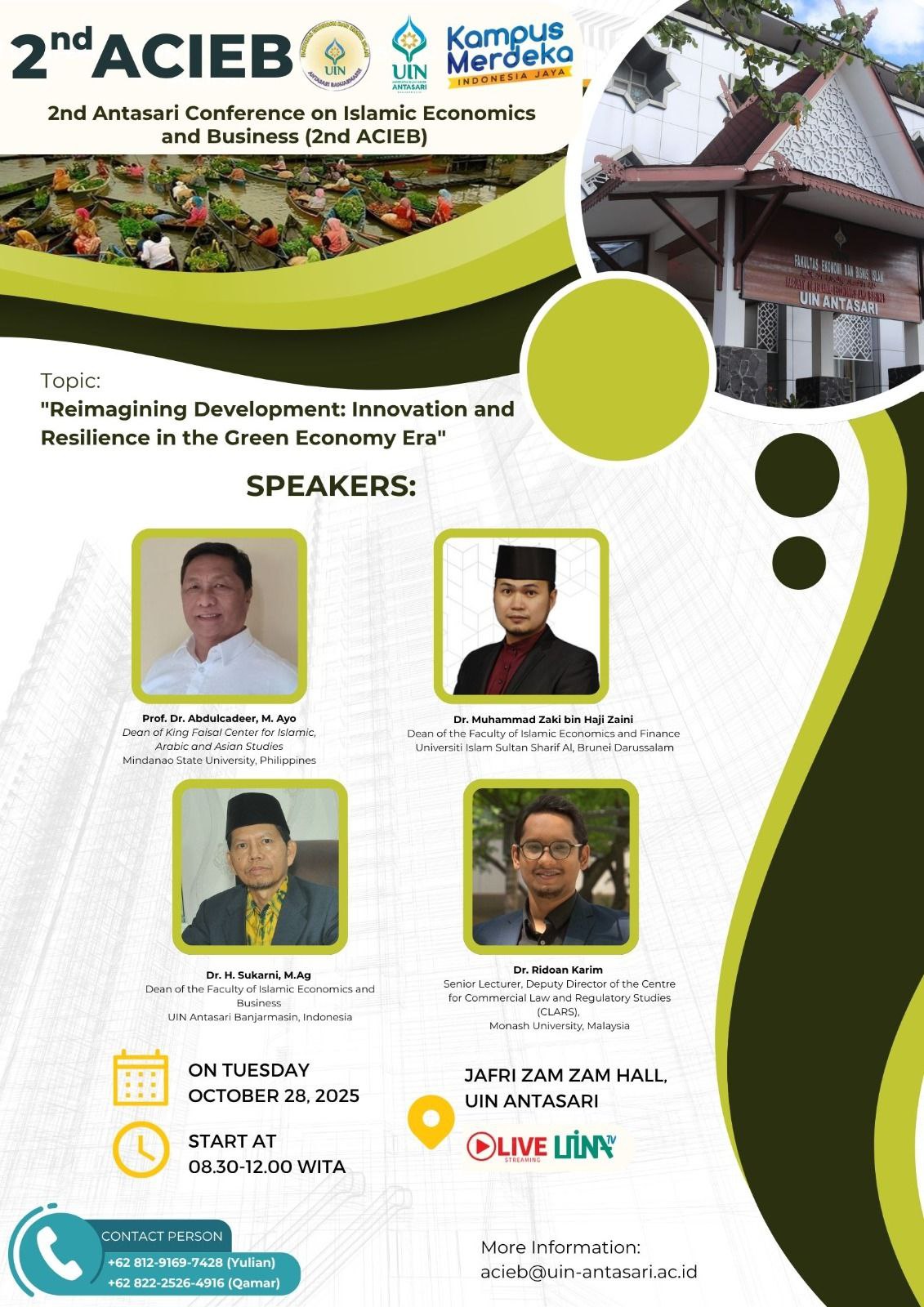Integration of Sharia Accounting Values in Mukhabarah Agreements to Achieve Justice and Green Economic Resilience in Malintang Lama, Gambut, Banjar Regency
Keywords:
Sharia Accounting, Mukhabarah Contract, Justice, Resilience, Green EconomyAbstract
The transition to a green economy demands an economic system based on justice, desire, and moral values. Sharia accounting plays a strategic role in realizing these principles through the application of values such as justice (al-'adl), trustworthiness, transparency (tabligh), and accountability (hisab). This study aims to analyze the integration of Sharia accounting values in the practice of mukhabarah contracts and their implications for distributive justice and green economic resilience in Malintang Lama Village, Banjar Regency. A qualitative approach based on field studies and conceptual analysis was used. Data collection techniques included in-depth interviews with Mukhabarah actors, religious leaders, agricultural extension workers, and academics familiar with local sharia economic practices. Field data were supplemented by a literature review of Sharia accounting principles and the concept of a green economy. This study found that mukhabarah serves not only as an agricultural cooperation contract but also as a value-based economic model and social capital that upholds the principles of al-'adl (justice), amanah (honesty and responsibility), tablīgh (transparency), and hisāb (accountability). This integration supports the realization of sustainable economic governance in accordance with Sharia principles. The application of the profit-sharing principle (nisbah), proportional to the contributions and risks of each party, reflects distributive justice in the context of sharia accounting. The innovation of replanting fund allocation demonstrates the embryo of sustainable accounting (green accounting), which expands the concept of accountability into multiple dimensions: financial, social, and ecological. This synergy between sharia accounting and the green economy forms a new paradigm of economic development based on maqāṣid al-syarī‘ah and in line with the Sustainable Development Goals (SDGs), particularly SDG 2 (Zero Hunger) and SDG 12 (Responsible Consumption and Production). Thus, mukhabarah in Malintang Lama Village can be seen as a micro-model of sharia-based green development that is relevant to strengthening social justice, economic independence, and ecological sustainability at the local level.References
Al-Zuhaili, W. (2010). Al-Fiqh al-Islami wa Adillatuh (Vol. 5). Dar al-Fikr. https://fliphtml5.com/uscyg/wmdb/Fiqih_Islam_Wa_Adillatuhu_5_%28Dr._Wahbah_Az-Zuhaili%29/
Bappenas Targetkan Indeks Ekonomi Hijau RI Mencapai 90,65% Pada 2045. (n.d.). Retrieved October 23, 2025, from https://nasional.kontan.co.id/news/bappenas-targetkan-indeks-ekonomi-hijau-ri-mencapai-9065-pada-2045
Burritt, R., & Schaltegger, S. (2014). Accounting towards sustainability in production and supply chains. The British Accounting Review, 46(4), 327–343.
Chaaben, N., Elleuch, Z., Hamdi, B., & Kahouli, B. (2022). Green economy performance and sustainable development achievement: Empirical evidence from Saudi Arabia. Environment, Development and Sustainability, 1–16. https://doi.org/10.1007/s10668-022-02722-8
Chapra, M. U. (2016). The future of economics: An Islamic perspective (Vol. 21). Kube Publishing Ltd. https://books.google.com/books?hl=en&lr=&id=0NGpDAAAQBAJ&oi=fnd&pg=PR11&dq=info:xuK0UWfdl1EJ:scholar.google.com&ots=298dWLzIFA&sig=Q6YrbmhJRn8Gueg-LppLlw3DQxw
Goh, C. S., Chong, H.-Y., Jack, L., & Mohd Faris, A. F. (2020). Revisiting triple bottom line within the context of sustainable construction: A systematic review. Journal of Cleaner Production, 252, 119884. https://doi.org/10.1016/j.jclepro.2019.119884
Griggs, D. J., Stafford-Smith, M., Gaffney, O., Rockstrom, J., Ohman, M. C., Shyamsundar, P., Steffen, W., Glaser, G., Kanie, N., & Noble, I. (2013). Sustainable development goals for people and planet. Nature, 495(7441), 305–307. https://doi.org/10.1038/495305a
Hammer, J., & Pivo, G. (2017). The Triple Bottom Line and Sustainable Economic Development Theory and Practice. Economic Development Quarterly, 31(1), 25–36. https://doi.org/10.1177/0891242416674808
Harahap, S. S. (1997). Akuntansi Islam. Bumi Aksara.
Le Blanc, D. (2015). Towards integration at last? The sustainable development goals as a network of targets. United Nations. https://www.un.org/en/desa/towards-integration-last-sustainable-development-goals-network-targets
Lidia, F. S., Sopingi, I., & Musfiroh, A. (2025). Analisis Keuangan Syariah dalam Memimpin Transisi Menuju Ekonomi Hijau: Kajian Green Sukuk Indonesia. JIES : Journal of Islamic Economics Studies, 6(2), 75–84. https://doi.org/10.33752/jies.v6i2.9848
Mahfuzah, A. (2023). Implementasi Green Marketing pada Pelaku UMKM Kain Sasirangan: Telaah Pemasaran Islami. Al-Ujrah | Jurnal Ekonomi Syariah, 1(01), 56–72.
Muctharom, M. Z. A. (2024). Implementasi Akad Mukhabarah pada Pertanian Padi. Jurnal Ekonomi Syariah Darussalam, 5(2), 1–13. https://doi.org/10.30739/jesdar.v5i2.3205
Pemerintah Dorong Penerapan Ekonomi Hijau untuk Stabilkan Pertumbuhan Ekonomi Jangka Panjang—Kementerian Koordinator Bidang Perekonomian Republik Indonesia. (2024). https://www.ekon.go.id/publikasi/detail/5861/pemerintah-dorong-penerapan-ekonomi-hijau-untuk-stabilkan-pertumbuhan-ekonomi-jangka-panjang
Permatasari, M. P., Triyuwono, I., & Mulawarman, A. D. (2021). Islamic Values in Accounting Information Governance of Third-Sector Organisation. Jurnal Akuntansi Multiparadigma, 12(1), 1–26. https://doi.org/10.21776/ub.jamal.2021.12.1.01
Rani, S. B., & Arismaya, A. D. (2024). Green accounting dan kepemilikan saham publik terhadap kinerja keuangan: Peran islamic social reporting pada perusahaan pertambangan di Indeks Saham Syariah Indonesia. Journal of Accounting and Digital Finance, 4(2), 97–111. https://doi.org/10.53088/jadfi.v4i2.1287
Sartika, B., & Sisdianto, E. (2024). Green Accounting dan Corporate Social Responsibility (CS): Konsep dan Implementasi dalam Bisnis Berkelanjutan. Akuntansi, 3(4), 128–135. https://doi.org/10.55606/akuntansi.v3i4.2642
Siregar, N. A., Anggraini, T., & Rahma, T. I. F. (2024). Analisis Sistem Mukhabarah Pada Usaha Tani Padi Di Desa Huraba Kecamatan Marancar Kabupaten Tapanuli Selatan. Al-Mutharahah: Jurnal Penelitian Dan Kajian Sosial Keagamaan, 21(01), 540–551.
Sugiyono. (2018). Metode Penelitian Bisnis: Pendekatan Kuantitatif, Kualitatif, Kombinasi dan R&D. Alfabeta.
Suryani, E. (2024). Analisis Penerapan Green Accounting dalam Mendukung Sustainability Pada Usaha Mikro Kecil dan Menengah (Studi Fenomenologi pada Rumah Produksi Amplang di Kecamatan Benua Kayong Kabupaten Ketapang). Jurnal KIAFE, 2(3), 54–71.
THE 17 GOALS | Sustainable Development. (n.d.). Retrieved October 23, 2025, from https://sdgs.un.org/goals
Triyuwono, I. (2012). Akuntansi syariah: Perspektif, metodologi, dan teori edisi 2 (Jakarta). RajaGrafindo Persada. //psb.feb.ui.ac.id%2Findex.php%3Fp%3Dshow_detail%26id%3D10194%26keywords%3D
UNDP Annual Report 2024. (2024). UNDP. https://www.undp.org/publications/undp-annual-report-2024

